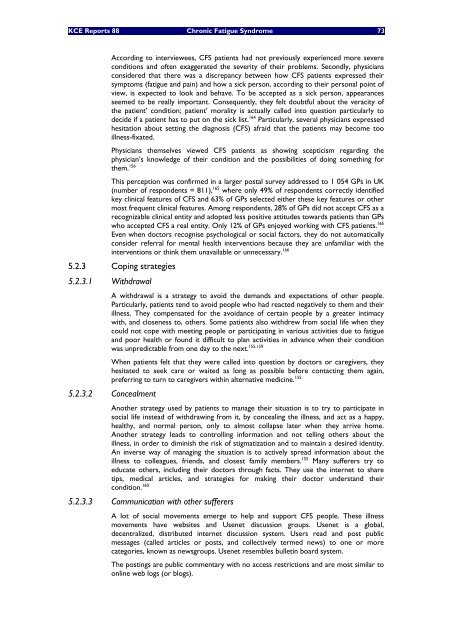Chronisch Vermoeidheidssyndroom: diagnose, behandeling en ...
Chronisch Vermoeidheidssyndroom: diagnose, behandeling en ...
Chronisch Vermoeidheidssyndroom: diagnose, behandeling en ...
Create successful ePaper yourself
Turn your PDF publications into a flip-book with our unique Google optimized e-Paper software.
KCE Reports 88 Chronic Fatigue Syndrome 73<br />
According to interviewees, CFS pati<strong>en</strong>ts had not previously experi<strong>en</strong>ced more severe<br />
conditions and oft<strong>en</strong> exaggerated the severity of their problems. Secondly, physicians<br />
considered that there was a discrepancy betwe<strong>en</strong> how CFS pati<strong>en</strong>ts expressed their<br />
symptoms (fatigue and pain) and how a sick person, according to their personal point of<br />
view, is expected to look and behave. To be accepted as a sick person, appearances<br />
seemed to be really important. Consequ<strong>en</strong>tly, they felt doubtful about the veracity of<br />
the pati<strong>en</strong>t’ condition; pati<strong>en</strong>t’ morality is actually called into question particularly to<br />
decide if a pati<strong>en</strong>t has to put on the sick list. 164 Particularly, several physicians expressed<br />
hesitation about setting the diagnosis (CFS) afraid that the pati<strong>en</strong>ts may become too<br />
illness-fixated.<br />
Physicians themselves viewed CFS pati<strong>en</strong>ts as showing scepticism regarding the<br />
physician’s knowledge of their condition and the possibilities of doing something for<br />
them. 156<br />
This perception was confirmed in a larger postal survey addressed to 1 054 GPs in UK<br />
(number of respond<strong>en</strong>ts = 811), 165 where only 49% of respond<strong>en</strong>ts correctly id<strong>en</strong>tified<br />
key clinical features of CFS and 63% of GPs selected either these key features or other<br />
most frequ<strong>en</strong>t clinical features. Among respond<strong>en</strong>ts, 28% of GPs did not accept CFS as a<br />
recognizable clinical <strong>en</strong>tity and adopted less positive attitudes towards pati<strong>en</strong>ts than GPs<br />
who accepted CFS a real <strong>en</strong>tity. Only 12% of GPs <strong>en</strong>joyed working with CFS pati<strong>en</strong>ts. 165<br />
Ev<strong>en</strong> wh<strong>en</strong> doctors recognise psychological or social factors, they do not automatically<br />
consider referral for m<strong>en</strong>tal health interv<strong>en</strong>tions because they are unfamiliar with the<br />
interv<strong>en</strong>tions or think them unavailable or unnecessary. 166<br />
5.2.3 Coping strategies<br />
5.2.3.1 Withdrawal<br />
A withdrawal is a strategy to avoid the demands and expectations of other people.<br />
Particularly, pati<strong>en</strong>ts t<strong>en</strong>d to avoid people who had reacted negatively to them and their<br />
illness. They comp<strong>en</strong>sated for the avoidance of certain people by a greater intimacy<br />
with, and clos<strong>en</strong>ess to, others. Some pati<strong>en</strong>ts also withdrew from social life wh<strong>en</strong> they<br />
could not cope with meeting people or participating in various activities due to fatigue<br />
and poor health or found it difficult to plan activities in advance wh<strong>en</strong> their condition<br />
was unpredictable from one day to the next. 155,159<br />
Wh<strong>en</strong> pati<strong>en</strong>ts felt that they were called into question by doctors or caregivers, they<br />
hesitated to seek care or waited as long as possible before contacting them again,<br />
preferring to turn to caregivers within alternative medicine. 155<br />
5.2.3.2 Concealm<strong>en</strong>t<br />
Another strategy used by pati<strong>en</strong>ts to manage their situation is to try to participate in<br />
social life instead of withdrawing from it, by concealing the illness, and act as a happy,<br />
healthy, and normal person, only to almost collapse later wh<strong>en</strong> they arrive home.<br />
Another strategy leads to controlling information and not telling others about the<br />
illness, in order to diminish the risk of stigmatization and to maintain a desired id<strong>en</strong>tity.<br />
An inverse way of managing the situation is to actively spread information about the<br />
illness to colleagues, fri<strong>en</strong>ds, and closest family members. 155 Many sufferers try to<br />
educate others, including their doctors through facts. They use the internet to share<br />
tips, medical articles, and strategies for making their doctor understand their<br />
condition. 160<br />
5.2.3.3 Communication with other sufferers<br />
A lot of social movem<strong>en</strong>ts emerge to help and support CFS people. These illness<br />
movem<strong>en</strong>ts have websites and Us<strong>en</strong>et discussion groups. Us<strong>en</strong>et is a global,<br />
dec<strong>en</strong>tralized, distributed internet discussion system. Users read and post public<br />
messages (called articles or posts, and collectively termed news) to one or more<br />
categories, known as newsgroups. Us<strong>en</strong>et resembles bulletin board system.<br />
The postings are public comm<strong>en</strong>tary with no access restrictions and are most similar to<br />
online web logs (or blogs).

















